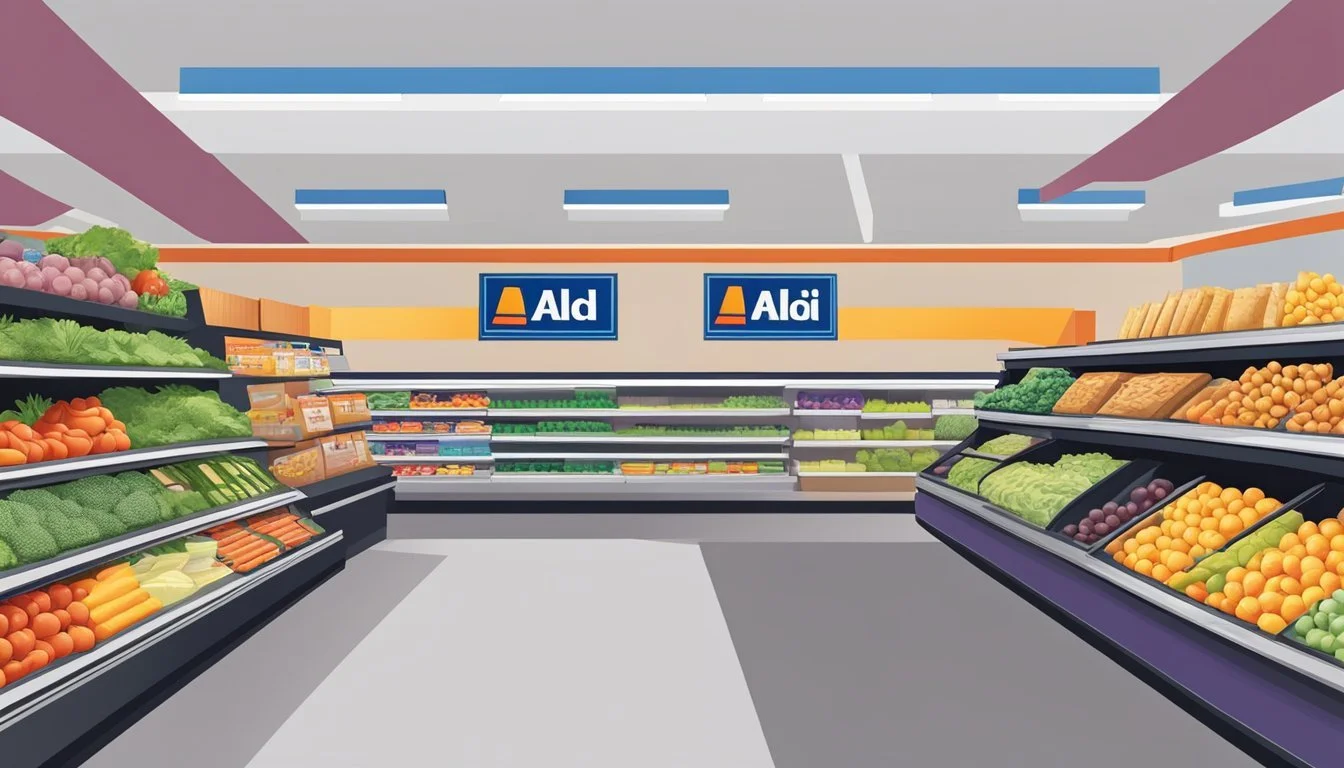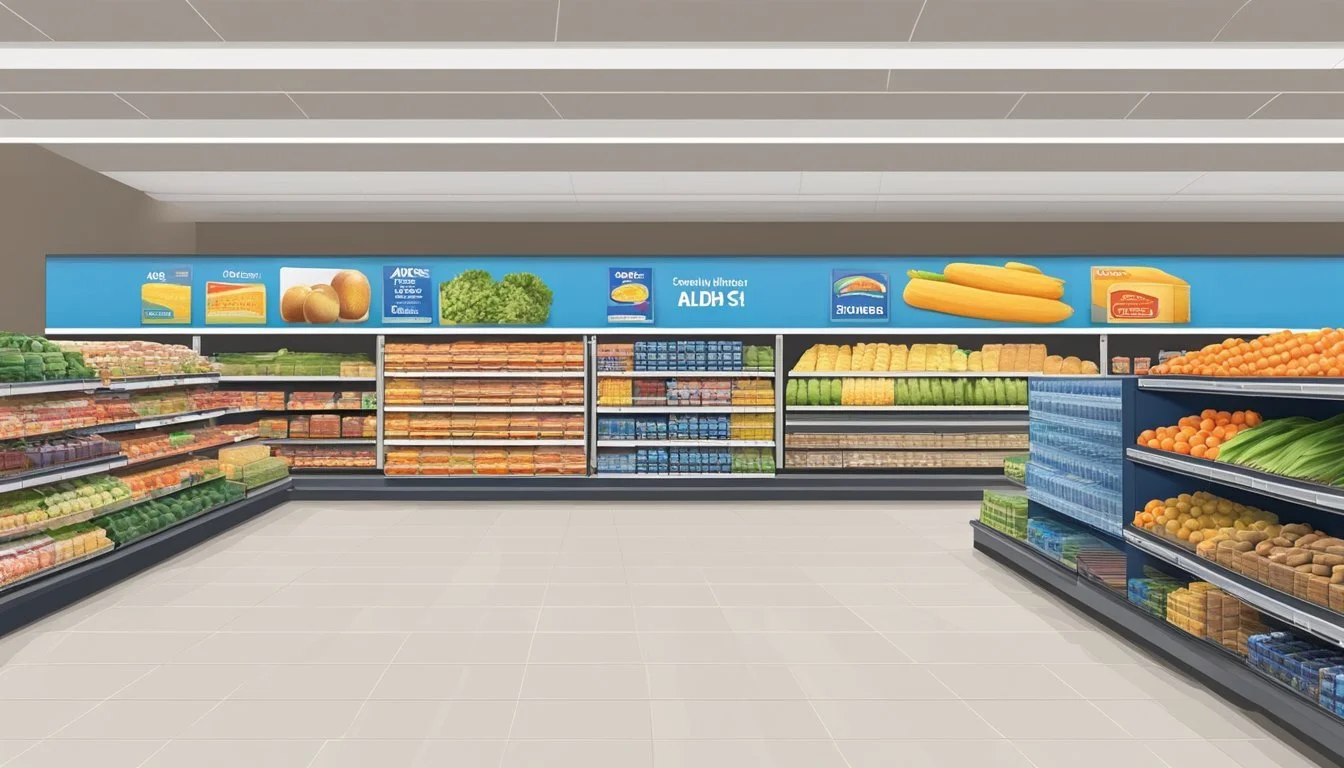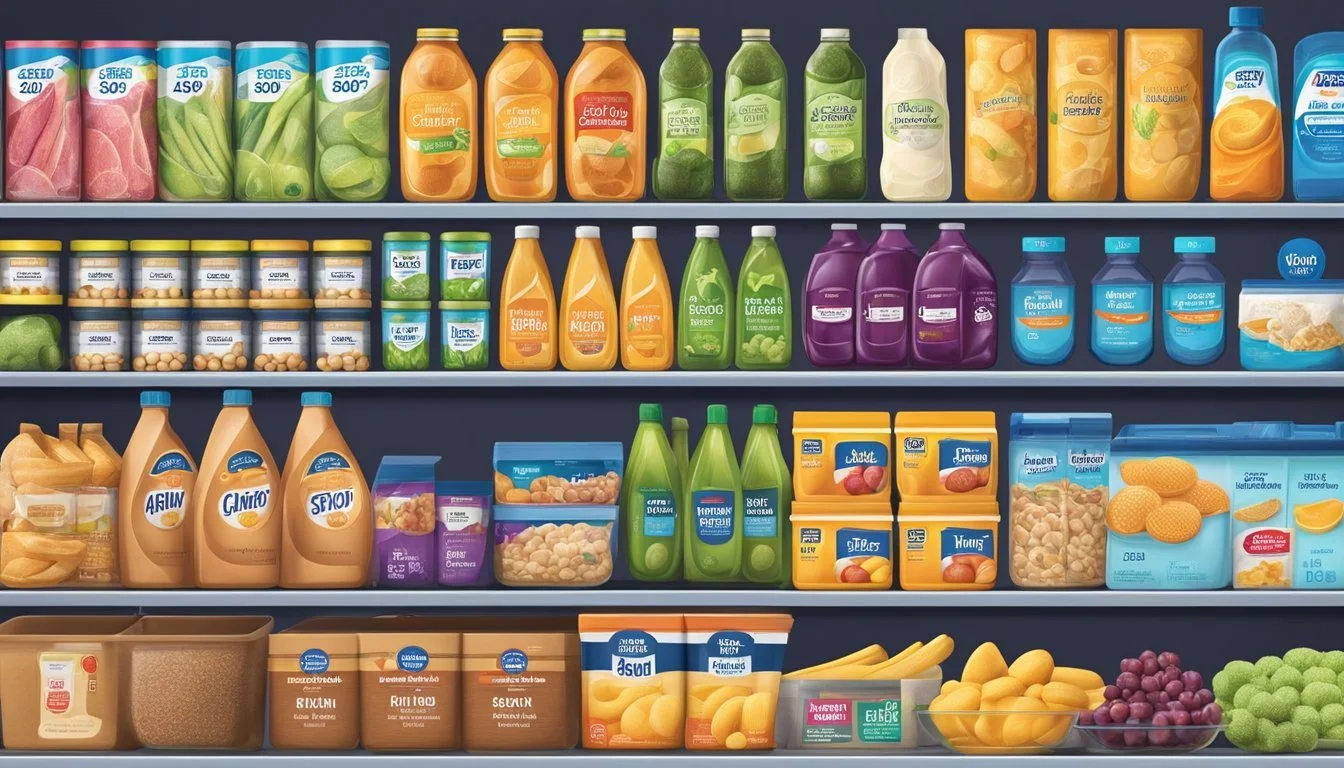Aldi vs Stop & Shop
Comparing Prices, Quality, and Shopping Experience
Part of Our Grocery Store Guide with Details on Aldi and Stop & Shop
When comparing grocery stores, consumers often weigh the importance of price against the quality and variety of products offered. Aldi and Stop & Shop represent two distinct options in the grocery store spectrum, each appealing to different shopper priorities. Aldi, known for its cost-efficiency, operates as a discount grocery chain and boasts substantial savings on a wide range of products. Its streamlined business model focuses on providing a select variety of goods, primarily under its own brand labels, which allows it to offer lower prices.
On the other side, Stop & Shop offers a broader selection, including a variety of national brands and a wider array of fresh produce and specialty items. While Stop & Shop's prices might be higher compared to Aldi, it compensates with quality, customer service, and a robust loyalty program which can result in long-term savings and added value for its customers. The choice between Aldi and Stop & Shop may boil down to individual shopping preferences, whether the shopper is looking to minimize their grocery bill, or desires a more traditional shopping experience with a larger selection and higher-end products.
History and Background
Choosing between Aldi and Stop & Shop often depends on one's shopping preferences and their appreciation for the store's history. Both retailers have rich backgrounds and have shaped the grocery industry in their respective regions.
Aldi's Origins
Aldi's story began in Germany in 1913, when Anna Albrecht opened a small store in Essen. Her sons, Karl and Theo Albrecht, took over the business in 1946, splitting it into Aldi Nord and Aldi Süd in 1960. They pioneered the discount grocery store model, which emphasizes efficiency and cost-savings. Aldi Süd operates Aldi stores in the United States, and it has maintained its focus on low prices and a streamlined shopping experience.
Founding Year: 1913
Location: Essen, Germany
US Expansion: 1976, first store in Iowa
Stop & Shop's East Coast Presence
Stop & Shop began its journey in 1914 as a small grocery store in Somerville, Massachusetts. It was founded by the Rabinovitz family and has since grown into a well-known supermarket chain along the East Coast. Stop & Shop prides itself on offering a wide variety of products, catering to a diverse customer base. With more than a century in the business, Stop & Shop has established a strong presence and built a loyal following.
Founding Year: 1914
Location: Somerville, Massachusetts
East Coast Footprint: Extensive network of stores
Both Aldi and Stop & Shop have evolved from their humble beginnings to become significant players in the grocery industry, each with its own approach to serving customers. Their histories underscore the different paths they have taken to achieve success in the retail market.
Store Ambiance and Layout
When comparing Aldi and Stop & Shop, customers will find distinct differences in the store ambiance and layout that cater to differing shopping preferences and needs.
Aldi's No-Frills Display
Aldi is known for its no-frills approach to product display. Products are typically presented in their original cardboard shipping boxes to reduce shelving time and labor costs. The store's design is utilitarian with basic shelving and minimal decor. This strategy aligns with Aldi's philosophy of simplicity and cost-saving, which is passed on to the customers in the form of lower prices. The layout is straightforward, with a consistent store format that allows shoppers to easily navigate and locate products.
Stop & Shop's Wider Aisles
Stop & Shop offers wider aisles when compared to Aldi, which contributes to a more traditional and spacious shopping experience. The store layout at Stop & Shop is designed to accommodate a larger variety of products, including a vast selection of name-brand items. The shelves are well-organized, and the store atmosphere is tailored to provide customers with a comfortable and aesthetically pleasing environment. This inclusive layout helps in creating a less crowded and more relaxed shopping experience for customers.
Product Selection
Choosing the right grocery store often comes down to the diversity and range of products available. Aldi and Stop & Shop offer distinct options that appeal to various shopping preferences.
Aldi's Private Labels Versus National Brands
Aldi is known for stocking a wide assortment of private labels. These brands are exclusive to Aldi and are typically sold at lower prices than their national brand counterparts. For shoppers focused on getting staples and grocery items at a discount, Aldi's model is highly attractive. Moreover, Aldi's weekly feature known as Aldi Finds introduces new, limited-time products, including food, home goods, and seasonal items, adding a unique and often surprising element to their selection.
Stop & Shop's Variety of Options
In contrast, Stop & Shop offers a considerably broader selection, including both private labels and national brands. Customers have access to an extensive array of products, ensuring they find virtually everything on their shopping list. This variety caters to shoppers who value a one-stop-shop experience where they can purchase specialty items alongside everyday grocery items. With over 21 times the product selection compared to Aldi, Stop & Shop stands out for its depth and breadth in product offerings.
Pricing and Value
When comparing Aldi and Stop & Shop, consumers are generally interested in how the pricing stacks up and what level of value they can expect from each store. This section breaks down the pertinent details of everyday pricing and the type of discounts and deals that shoppers might encounter.
Comparing Everyday Prices
Aldi is well-known for its low-priced items, stemming from its discount supermarket model. Prices at Aldi are often cheaper due to a focus on store-brand products and an efficient store layout that reduces overhead costs.
Milk: Aldi may offer milk at a lower cost per gallon compared to Stop & Shop.
Eggs: A carton of eggs typically comes in at a cheaper price point at Aldi.
Produce: Shoppers can find everyday low prices on fresh produce, with Aldi frequently undercutting Stop & Shop.
In contrast, Stop & Shop offers a larger variety of products, which may influence the higher pricing. Although their prices for everyday items are often higher than Aldi's, the added variety can be a bonus for consumers looking for specific brands or specialty items.
Discounts and Deals
Stop & Shop provides a range of discounts and deals through its loyalty program, which can lead to significant savings for frequent shoppers.
Loyalty Program: Members can access special pricing and personalized deals.
Digital Coupons: Shoppers can use the Stop & Shop app for exclusive discounts.
Aldi, on the other hand, promotes special buys—limited-time sale items that can offer steep discounts on both food and non-food items. These deals typically highlight the store's commitment to cheap prices, making it attractive for shoppers on a tight budget.
Weekly Specials: Aldi's ads highlight rotating deals that often undercut competitors.
Aisle of Aldi Finds: A section dedicated to deeply discounted, often non-grocery, items.
Quality of Goods
When comparing the quality of goods between Aldi and Stop & Shop, customers will observe differences particularly in fresh produce and meat/dairy offerings, shaped by each store's sourcing and pricing strategies.
Fresh Produce Assessment
At Aldi, fresh produce is offered at competitive pricing, but the selection may be limited compared to larger supermarkets. Customers find that while some produce items are a good value, others might lack in freshness due to the lower turnover of specialty items. On the other hand, Stop & Shop provides a broader variety of fresh produce, which often includes organic and locally sourced options. However, consumers should be mindful of the pricing, which can reflect the more extensive selection and perceived quality.
Meat and Dairy Standards
When it comes to meat and dairy, the standards of quality at both stores vary notably. Aldi's meats and dairy, including items like milk, eggs, and cheese, meet general quality expectations at often lower price points. The store focuses on providing staple items that satisfy basic quality standards. In contrast, Stop & Shop offers a wider range of meats and dairy products, with emphases on brand variety, including premium and organic options. Customers recognize Stop & Shop for its ability to provide higher-end choices, such as grass-fed beef and artisanal cheeses.
Organic and Specialty Products
In comparing Aldi and Stop & Shop for their offerings of organic and specialty products, it's vital to consider the variety, affordability, and accessibility of items like organic dairy and frozen foods.
Availability at Aldi
Aldi has made a name for itself in offering a competitive selection of organic products, including dry goods like pasta and canned foods, as well as fresh produce. Customers can find organic yogurt, hummus, and a variety of cheeses at reasonable prices. Their commitment to affordability extends to organic items, often outpricing competitors. However, the selection, while cost-effective, may be more limited compared to larger grocery chains.
Organic Dairy: Milk, Yogurt
Cheeses: A variety of both domestic and imported options
Frozen Foods: Organic fruits and vegetables
Dry Goods: Pasta, cereal, snack items
Options at Stop & Shop
Stop & Shop caters to a broader organic market, with over 400 locations offering a wide and extensive range of products. Shoppers seeking organic options will find a large assortment of fresh produce alongside specialty dairy products like organic yogurt and cheese. Additionally, Stop & Shop provides a diverse selection of organic frozen foods, satisfying a demand for variety and convenience.
Organic Produce: A comprehensive range encompassing seasonal and year-round items
Cheeses: Specialty and artisan selections, including organic options
Frozen Foods: An expansive selection including meals and individual ingredients
Dry Goods: A full range of products catering to various dietary needs and preferences
Shop Experience
When comparing the shopping experience at Aldi and Stop & Shop, one may find distinct differences in checkout efficiency and customer service.
Checkout Efficiency
Aldi is recognized for its fast checkout process. They have a unique system where items have multiple barcodes, making it easier for cashiers to scan products quickly. This focus on speed helps to keep lines short and move customers through the store efficiently. On the other hand, Stop & Shop offers self-checkout options in many locations, which some customers prefer for a quick shopping trip when buying fewer items.
Aldi: Multiple barcodes for quicker scanning.
Stop & Shop: Self-checkout options available for convenience.
Customer Service
Stop & Shop tends to have a broader range of customer service options, including in-store pharmacies, a larger number of staff available to assist, and a loyal following, particularly in the Northeast. An expert in customer service would note the company's commitment to a comprehensive shopping experience.
Aldi: More limited customer service options.
Stop & Shop: Offers additional services like pharmacies, and generally has more staff available.
In terms of cleanliness, both stores prioritize a clean shopping environment, with in-store cleaners ensuring the space is presentable and hygienic. The level of cleanliness contributes positively to the overall customer experience.
Shopping Convenience
When choosing between Aldi and Stop & Shop, shoppers should consider location access, grocery delivery services, and in-store digital features to determine which store offers greater convenience.
Location Access
Aldi operates over 2,000 stores across 38 U.S. states, primarily focusing on a more streamlined, no-frills shopping experience. They typically select locations that allow for easy access and minimal overhead to keep prices low. On the other hand, Stop & Shop, with approximately 415 stores in the Northeast, offers a more traditional supermarket layout, often in locations that are convenient for those living in the five Northeast states they serve.
Grocery Delivery Services
Aldi has partnered with third-party services to provide grocery delivery, broadening their accessibility to those who prefer shopping online. This offering can be particularly advantageous for time-strapped consumers or those who are unable to visit physical stores. In contrast, Stop & Shop also offers delivery services and often has their own dedicated platform, allowing customers to shop online directly with the supermarket and utilize digital coupons for additional savings.
In-Store Digital Features
Stop & Shop prominently features digital solutions in their stores to enhance the shopping experience. Customers can take advantage of digital coupons and in-store navigational tools to expedite their shopping. While Aldi traditionally maintains a more basic, cost-efficient approach to in-store shopping, they too are increasingly incorporating digital coupons through their mobile app, responding to consumer demand for tech-friendly shopping options.
Brands and Affordability
When comparing Aldi and Stop & Shop, one must consider the type and range of brands each store offers, as well as their pricing strategies. While Aldi focuses on budget-friendly private labels, Stop & Shop provides a broader selection of name-brand products.
Budget-Friendly Alternatives at Aldi
Aldi primarily stocks its shelves with private label products, which allows the store to offer goods at lower prices. The discount grocery store's strategy is to provide essential items without the premium costs associated with name brands. Aldi's emphasis is on affordability, which is reflected in their limited selection but deeply discounted prices.
Private Labels: Major cost savings
Essentials: Limited selection geared towards budget-conscious shoppers
Stop & Shop's Name-Brand Offerings
Conversely, Stop & Shop boasts a wider array of name-brand products, catering to consumers who prefer recognized labels over store brands. Shoppers at Stop & Shop can find an extensive product lineup providing them with more choices.
Name-Brand Products: Offers consumers well-known brands
Product Variety: Wide selection, catering to diverse consumer preferences
Customer Loyalty and Perceptions
Customer loyalty plays a significant role in the competitive landscape of grocery retailers. How customers perceive a store's quality, freshness, and value can drive their decision to remain loyal or shop elsewhere.
Aldi's Cult Following
Aldi has nurtured a loyal following by offering quality goods at competitive prices. 56% of Aldi's customers report being highly satisfied with the quality and freshness of its products. Its strategy involves selling primarily private label items, which are typically cheaper than national brands, allowing it to pass savings to its customers. This has helped Aldi cultivate a perception of value, and its followers often regard it as a one-stop shopping destination for affordable groceries.
Stop & Shop's Trust Among Consumers
Stop & Shop enjoys a sturdy relationship with its consumer base, who trust the store for its variety and the depth of products offered. The store provides more than 21 times the product variety compared to Aldi, catering to customers who value selection alongside quality. Regular shoppers at Stop & Shop experience consistent service and cleanliness, which bolsters their confidence in the store as a reliable grocery provider.
While not mentioned in the search results, Hannaford is another competitor in the grocery market that may affect the loyalty and perceptions of customers. However, the available data does not provide specific insights into Hannaford's impact on customer loyalty in relation to Aldi and Stop & Shop.
Market Position and Competition
In the competitive landscape of retail grocers, Aldi stands out for its low prices and efficient store model. The chain's aggressive expansion and pricing strategies have positioned it as a significant player in the grocery industry, directly competing with major retailers like Walmart and Target.
Aldi vs. Walmart and Target
Walmart and Target are well-known for their broad product assortments and competitive pricing strategies. Aldi, on the other hand, has carved out a niche by offering a smaller selection of mostly private label products at a lower price point. This focus on cost-saving and efficiency allows Aldi to compete effectively by passing savings onto consumers. While Walmart boasts a wide variety of goods in large supercenters, Target complements its grocery offerings with strong non-food selections, including clothing and home goods.
Walmart:
Broad assortment of goods, including groceries
Operates large supercenters
Target:
Grocery plus strong non-food presence
Known for partnerships with high-profile brands and designers
Regional Comparisons with Hannaford and Save A Lot
Regionally, grocery stores like Hannaford and Save A Lot also vie for market share with Aldi. Hannaford is known for its focus on quality products and regional fare, providing a different value proposition to customers who prioritize a broader selection and local products. Save A Lot, similar to Aldi, markets itself as a discount grocer with a no-frills shopping experience geared toward value-conscious shoppers.
Hannaford:
Emphasizes quality and regional products
Appeals to those looking for a wider product variety
Save A Lot:
Discount grocer with a similar model to Aldi
Attracts budget-sensitive customers with its cost-efficiency approach
Aldi's strategy of a lean selection and predominantly private labels enables it to maintain low prices and compete with larger supermarkets and grocery chains, all while continuing its expansion and market share growth.
Conclusion
Choosing between Aldi and Stop & Shop depends on individual shopping preferences and priorities. Those focusing principally on savings may lean towards Aldi. The retailer's strategy to offer primarily private labels assists in keeping the grocery bill lower. In contrast, shoppers prioritizing service and quality with a more extensive selection might find Stop & Shop more aligned with their needs.
Aldi:
Ideal for budget-conscious shoppers.
Limited selection with a focus on private labels.
Smaller grocery bill due to lower costs.
Stop & Shop:
A wide variety of products is available.
More service options and higher perceived quality.
Larger store footprint in the Northeastern US.
It's not a simple case of declaring a universal winner as both stores serve different market segments effectively. Understanding each store's strengths can guide consumers in choosing the most suitable option for their shopping list and wallet.












